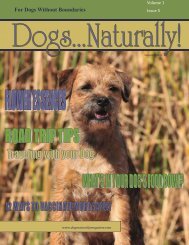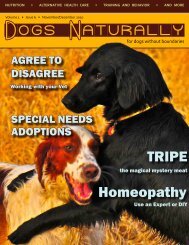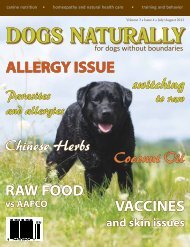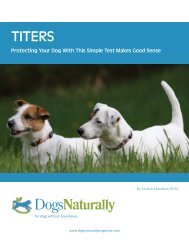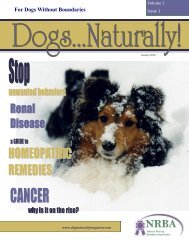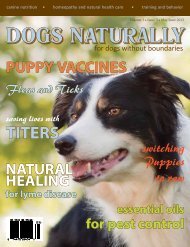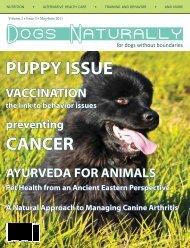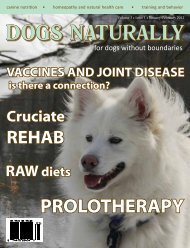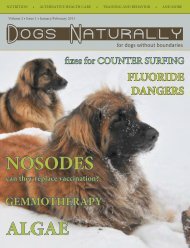July/August 2010 - Dogs Naturally Magazine
July/August 2010 - Dogs Naturally Magazine
July/August 2010 - Dogs Naturally Magazine
You also want an ePaper? Increase the reach of your titles
YUMPU automatically turns print PDFs into web optimized ePapers that Google loves.
scraps of food, the street dogs were everywhere.<br />
These potcakes, named after<br />
the leftover rice cake from the traditional<br />
Bahamian peas and rice dish, were starving,<br />
sick and abandoned. Litters of puppies<br />
lived under the houses, and were<br />
left completely on their own.<br />
Never had I seen so many starving, sick<br />
and abandoned dogs and cats in my life.<br />
Every time I rode a bike or walked into<br />
the village, I saw feral strays digging in<br />
the trash or cruising dangerously next to<br />
the road. Puppies were everywhere,<br />
and they also ventured near the cars.<br />
Many were killed, only to be left there<br />
to rot.<br />
The facts relating to animal control on<br />
Grand Bahama are sobering. There is<br />
no animal control agency; the only organization<br />
that deals with feral potcakes<br />
is The Humane Society of Grand<br />
Bahama in Freeport. It is difficult to get<br />
a van to leave Freeport and drive all the<br />
way out to West End to take the dogs to<br />
the shelter. Moreover, many feral potcakes<br />
are so wild that they can never<br />
trust a human, or be rehabilitated.<br />
The last, chilling fact about Grand Bahamas'<br />
animals was that the shelter was a<br />
high-kill facility, with a 95% euthanasia<br />
rate. The advent of the hurricanes aggravated<br />
an existing problem; by 2005<br />
more animals than ever were put to<br />
sleep.<br />
Deeply moved to do something, I contacted<br />
the Manager of the Humane<br />
Society of Grand Bahama, Tip Burrows.<br />
I explained that I wanted to help, that<br />
visiting her country with its animal<br />
problems was emotionally draining for<br />
me. I felt a sense of urgency to give<br />
back to these gentle canines, and ease<br />
their plight.<br />
The good news was that I had already<br />
started a 501(c) (3) non-profit in Colorado<br />
to help West End youth with college<br />
funding two years earlier in 2002.<br />
That enabled me to wrap the animal<br />
welfare efforts into an existing organization:<br />
The Kohn Foundation. We called<br />
our new offspring BARC for the Bahamian<br />
Animal Rescue Committee.<br />
This was the beginning of a very powerful<br />
partnership with The Kohn Foundation/BARC<br />
and The Humane Society.<br />
Now our animal welfare efforts had an<br />
official title and role in the non-profit. It<br />
was a bit daunting to start completely<br />
from scratch, but the effort garnered its<br />
own momentum.<br />
I asked everyone I knew to send them<br />
money. Little by little funds came in and<br />
then it began to explode. Our grassroots<br />
organization was making progress. We<br />
were making a difference in the lives of<br />
Grand Bahamas' potcakes, and it felt<br />
great.<br />
In 2007, The Kohn Foundation helped<br />
raise money for the first major spay/<br />
neuter initiative on Grand Bahama. Over<br />
18 veterinarians and techs paid their way<br />
and donated their vacation time to perform<br />
surgery. The result was more than<br />
300 sterilizations in a week, with additional<br />
amputations and emergency surgeries.<br />
www.dogsnaturallymagazine.com <strong>July</strong>/<strong>August</strong> <strong>2010</strong> | 13



